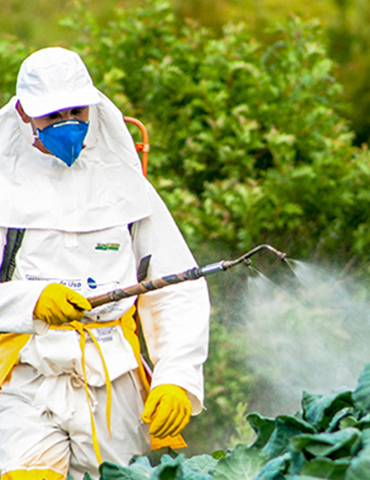Agriculture

In 1950, one apple was sufficient for daily iron requirement as compared to in 2023, wherein 26 apples are required

Algal bloom appears in the water body and as a result, oxygen level decreases and leading to death of aquatic animals

Exposure to toxic chemicals leads to development of autoimmune diseases
-
Nano Fertiliser
-
Nano Pesticide
Nano Fertiliser
Nano Urea
Urea fertilizer has been the principal source of nitrogen for growing crops. Using urea fertilizer increases and maintains agricultural production by providing sufficient nitrogen nutrients for crop growth. According to studies, standard urea nitrogen fertilizer has a low usage efficiency, with plants only absorbing and consuming a fraction of it. The majority of the remaining nitrogen in the soil after application dissipates through processes such as ammonia vaporization, nitrate leaching, nitrification, and denitrification, resulting in major environmental challenges such as soil acidification, increased greenhouse gas emissions, and water body eutrophication.
We have developed nano urea which overcomes the issues faced due to conventional urea fertiliser. The benefits are as follows-
-
500 ml nano urea bottle substitutes 50kg urea bag
-
The increased availability of nitrogen due to controlled release results in higher crop yields
-
Minimizes the environmental footprint
-
Significantly reduces the cost of raw materials for the farmer
-
Easy to handle and store
Nano Zinc
Zinc deficiency is one of the biggest problems among the micronutrient deficiencies in plants and crops around the globe. The deficiency of zinc in plants decreases the crop quality as well as the production rate. Mostly, zinc sulfate is used to overcome zinc deficiency. However, it was not proven beneficial for the crops. That is why; it is now substituted with zinc oxide fertilizer. The direct application of zinc oxide fertilizer improves seed coating, root dipping, and zinc deficiency. Moreover, zinc oxide fertilizer also provides the foliar applications and benefits of the most essential micronutrient, zinc.
Much like traditional chemical fertilizers, zinc oxide encounters similar challenges. This scenario prompts the emergence of nano zinc oxide, which brings along numerous advantages-
-
Increase in Zn content in grains
-
Promotes root development and increases efficiency
-
Leads to stronger, taller and greener leaves
-
Reduces the environmental stress
Nano Pesticide
Pesticides have had both positive and negative impacts on plant and human life. On the positive side, pesticides play a crucial role in protecting crops from pests, diseases, and weeds, contributing to increased agricultural productivity and food security. However, the overuse or misuse of pesticides has raised concerns about their adverse effects. Negative impacts on plants include pesticide residues in soil and water, which can harm non-target plants, disrupt ecosystems, and lead to biodiversity loss. Pesticide resistance in pests is also a growing problem, reducing the effectiveness of certain pesticides over time. In human life, exposure to pesticides through food, water, or occupational contact can pose health risks. Some pesticides are associated with acute and chronic health effects, including respiratory issues, skin disorders, and potential links to certain cancers.
It is important to replace conventional pesticides with biopesticides to ensure both plant and human health. We have developed a botanically derived nano pesticide which-
-
has the property of controlled release and enhanced bioavailability
-
acts as a feeding deterrent, insect growth disruptor (IGD), and sterilant
-
provides the plant with protection from pests and insects for a longer period
-
easy to handle and store




